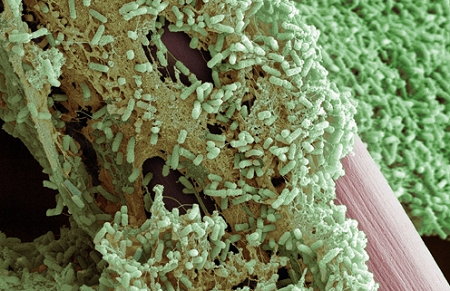New Biofilm Inhibitor May Provide Class of Antibiotics to Treat Drug-Resistant Bacteria

Acinetobacter baumannii, a multidrug-resistant bacteria associated with hospital-acquired infections, grows on surfaces in sticky sheet-like structures called biofilms that allow the bacteria to resist against antibiotics and traditional antimicrobial agents. Previously, no drugs have been successfully developed to disarm the biofilm defense of these bacteria. Researchers from the University of Michigan Life Sciences Institute and School of Public Health recently discovered a new class of chemical compounds called cahuitamycins capable of inhibiting biofilm formation. The compound was found from a high-throughput screen of natural product extracts isolated from marine micro-organisms worldwide. The researchers also developed a strategy to massively synthesize and isolate the compound from the bacteria that produce it as well as to modify it to improve its anti-biofilm potency. Cahuitamycins hold great promise to be the first class of therapeutic agents to fight against biofilm forming properties of life-threatening bacterial pathogens.
References
- Park SR, Tripathi A, Wu J, et al. Discovery of cahuitamycins as biofilm inhibitors derived from a convergent biosynthetic pathway. Nature Communications, 2016;7:10710 DOI: 10.1038/ncomms10710








